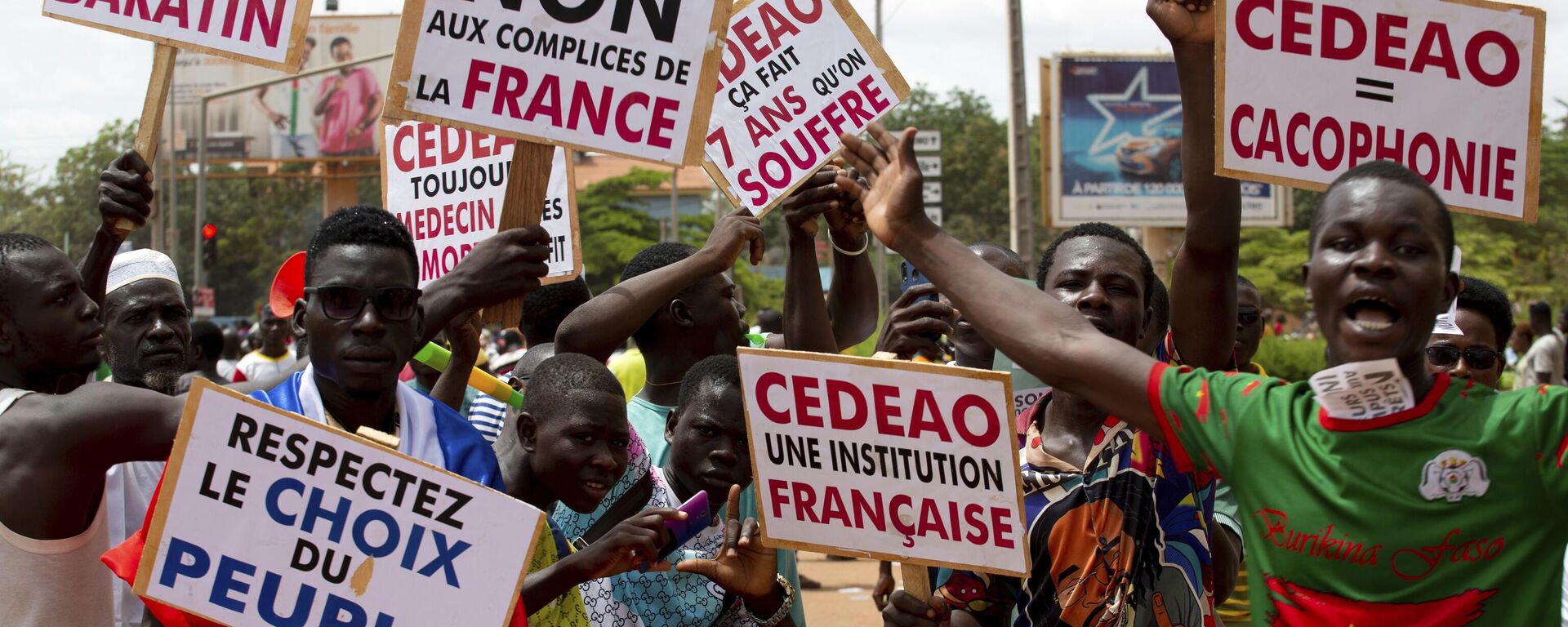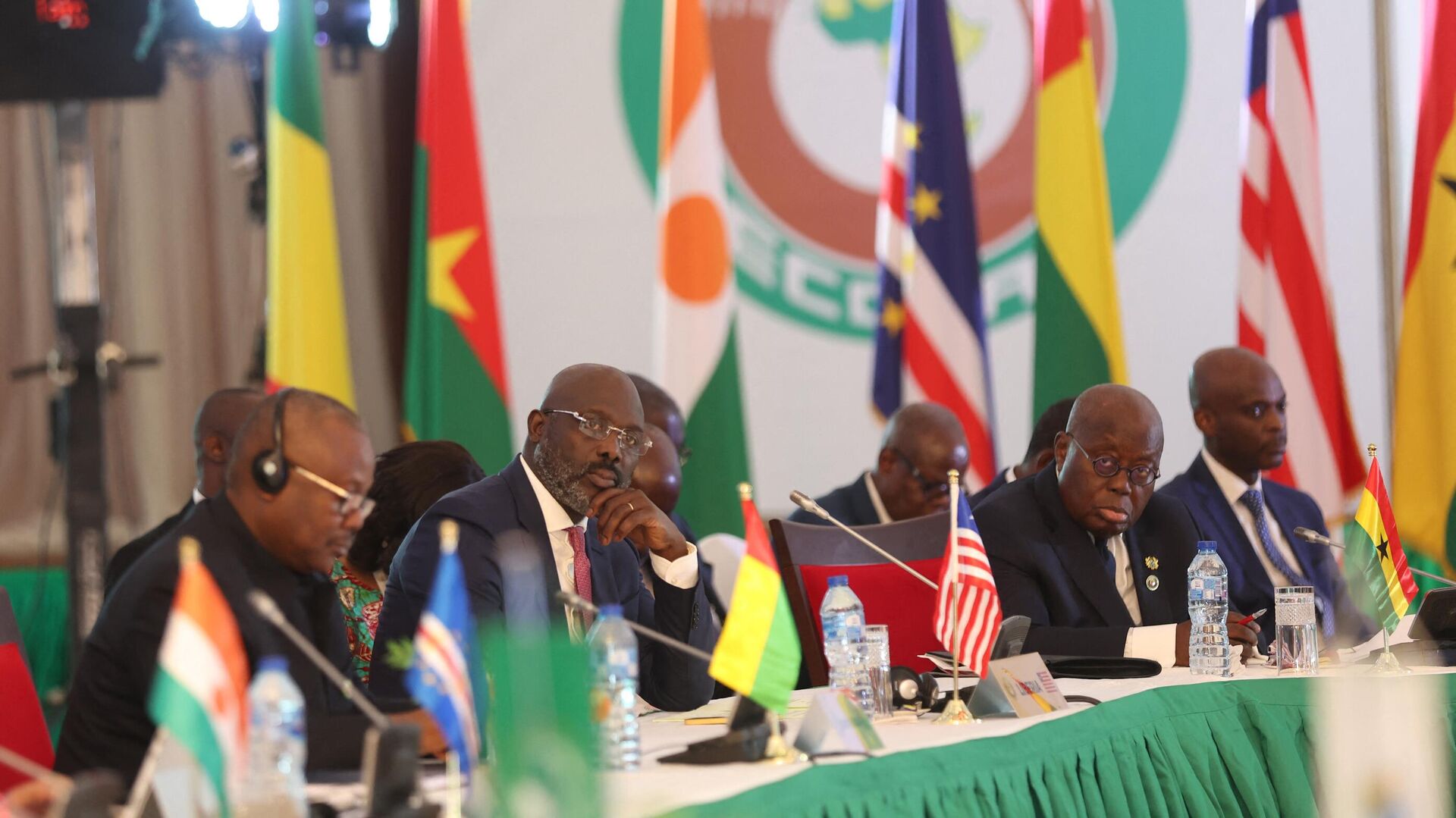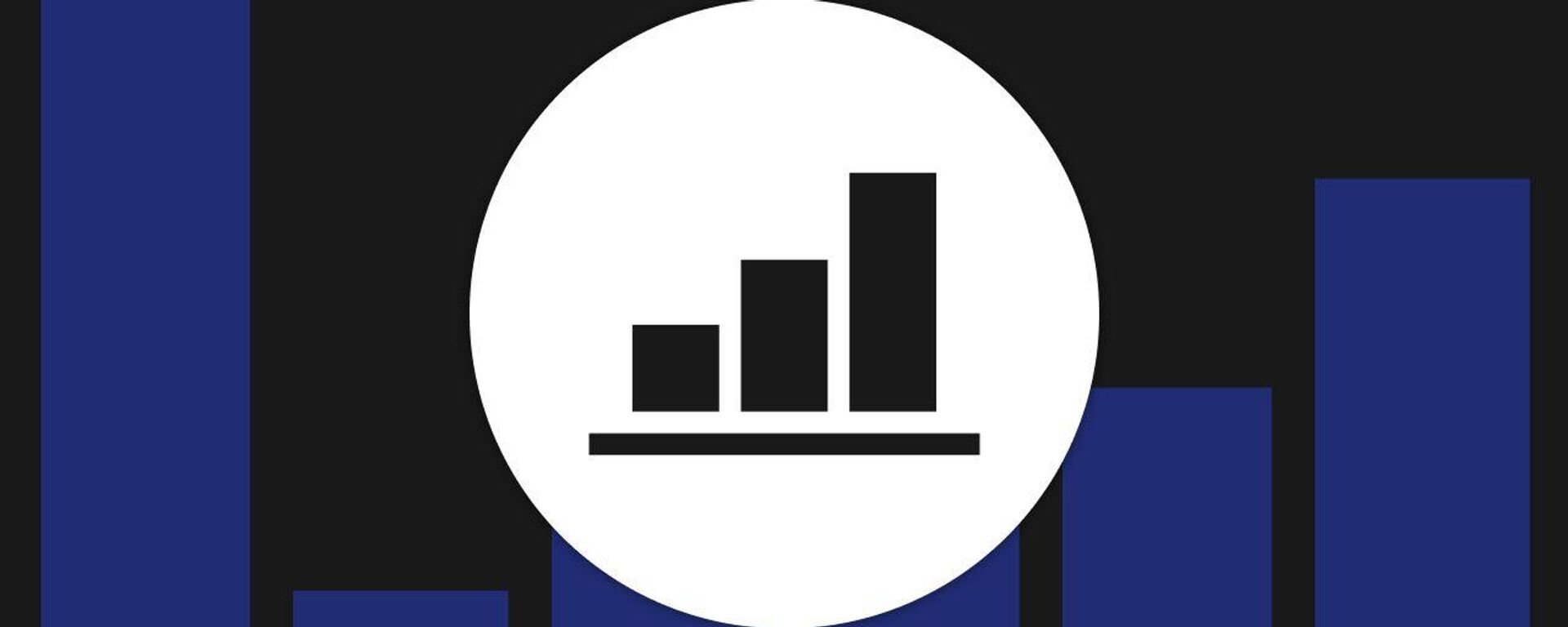https://sputnikglobe.com/20240302/sanctions-debacle-left-dysfunctional-fragmented-ecowas-with-egg-on-its-face-1117084039.html
Sanctions Debacle Left ‘Dysfunctional, Fragmented’ ECOWAS With ‘Egg on Its Face’
Sanctions Debacle Left ‘Dysfunctional, Fragmented’ ECOWAS With ‘Egg on Its Face’
Sputnik International
The Economic Community of West African States has egg on its face after its sanctions failed to bring Niger to heel and the bloc is now begging Niger, Mali and Burkina Faso to return to the organization.
2024-03-02T03:17+0000
2024-03-02T03:17+0000
2024-03-02T03:17+0000
economic community of west african states (ecowas)
brics
niger
mali
patrice lumumba
burkina faso
analysis
fault lines
https://cdn1.img.sputnikglobe.com/img/07e8/01/1e/1116481236_0:480:2788:2048_1920x0_80_0_0_5de05535b8e3d414da6710f1977018a3.jpg
In late January, Niger, Mali and Burkina Faso announced they plan to leave ECOWAS “without delay.” Days later, ECOWAS announced the end of travel, commercial and economic sanctions on Niger and urged the three countries to reconsider their decision.The debacle has left ECOWAS with egg on its face, Koffi Kouakou, an analyst and senior research fellow at the Center for Africa and China Studied at the University of Johannesburg, told Sputnik’s Fault Lines on Friday.ECOWAS officials have insisted that no members can leave without a year's notice, however, the three countries argue that the sanctions placed on Niger were illegal and enable them to leave immediately.Kouakou explained that the sanctions backfired on the ECOWAS countries who are now having significant economic issues on their own, pointing to inflation issues in Nigeria, Cote d’Ivoire, Benin and Senegal as examples.Kouakou argued that Africa is poised to be “the centerpiece” of geopolitics and geoeconomics in the coming years, due in large part because of its vast wealth of natural resources.“There's something that's also developing, that's called resource nationalism, which means many of the people, the leaders in Africa are thinking, 'wait a minute, our resources must first benefit us, or at least benefit us before it goes somewhere else.' And this is a movement that's now growing more, making people aware that Africa, geo-economically, is very important,” he argued, while also pointing to Egypt and Ethiopia joining BRICS as evidence for Africa’s growing geopolitical importance.“So that's going to keep growing, and Africa is at the heart of it and the old colonial powers are now very worried,” Kouakou argued, adding later that “Africa is not a poor continent, it was made poor. And that's where they now need to organize themselves to be able to face those challenges coming from outside. I think that’s going to be the challenge of the century for Africa.”Show host Jamarl Thomas asked if he thinks Africa will be able to meet those challenges. “I think we have a chance,” Kouakou replied. “If we’re seriously supported by Russia and China… to really make sure we can get rid of all these potential attacks.”Noting that a large cache of arms for a potential coup against Niger President Abdourahamane Tchiani was just found in Niger, Kouakou argued that Western powers in Africa have not given up. “You can see that they're still there, they're not giving up, they're going to try to do what they did in the '60s killing ... all these African leaders [like former Prime Minister of the Democratic Republic of the Congo] Patrice Lumumba,” he recalled. “But we think we've got a shot this time. We need to get together, and I think the Sahelian alliance states [of Niger, Mali and Burkina Faso] are at an excellent [starting] point to succeed.”
https://sputnikglobe.com/20240301/indicators-and-forecasts-of-world-gdp-of-g7-and-brics--1117065594.html
https://sputnikglobe.com/20240128/niger-mali-and-burkina-faso-quit-ecowas-citing-threats-to-members-1116450803.html
niger
mali
burkina faso
Sputnik International
feedback@sputniknews.com
+74956456601
MIA „Rossiya Segodnya“
2024
News
en_EN
Sputnik International
feedback@sputniknews.com
+74956456601
MIA „Rossiya Segodnya“
Sputnik International
feedback@sputniknews.com
+74956456601
MIA „Rossiya Segodnya“
niger leaves ecowas, sahelian alliance states, africa kicking out colonial powers, france leaves africa
niger leaves ecowas, sahelian alliance states, africa kicking out colonial powers, france leaves africa
Sanctions Debacle Left ‘Dysfunctional, Fragmented’ ECOWAS With ‘Egg on Its Face’
Last summer, The Economic Community of West African States (ECOWAS) threatened military action against Niger after that country’s Western-supported leader was thrown out of office by the country’s military leadership. It later backtracked from those threats, instituting sanctions instead.
In late January, Niger, Mali and Burkina Faso announced they plan to leave ECOWAS “without delay.” Days later, ECOWAS announced the end of travel, commercial and economic sanctions on Niger and urged the three countries to reconsider their decision.
The debacle has left ECOWAS with egg on its face, Koffi Kouakou, an analyst and senior research fellow at the Center for Africa and China Studied at the University of Johannesburg,
told Sputnik’s Fault Lines on Friday.
“[It’s] too late [for Niger, Burkina Faso and Mali to rejoin ECOWAS] because, in fact, [leaving] is probably the best gift any African country has ever had, to get out [from under] the yoke of neocolonialism by proxy.”
ECOWAS officials have insisted that no members can leave without a year's notice, however, the three countries argue that the sanctions placed on Niger were illegal and enable them to leave immediately.
“ECOWAS now has egg on its face. It’s probably one of the most dysfunctional and fragmented regional bodies we have,” Kouakou explained. “It’s clear they’re not responding to the needs of the people but to the needs of a very small [number of] oligarchs, the elite who are the paymasters of Europeans and the West in general.”
Kouakou explained that the sanctions backfired on the ECOWAS countries who are now having significant economic issues on their own, pointing to inflation issues in Nigeria, Cote d’Ivoire, Benin and Senegal as examples.
“The president of Nigeria, who’s heading ECOWAS, has been literally begging the three countries to come back. I can tell you, I can put my hands to God, they’re not going to come back because this is their best ticket to be economically and monetarily and even politically sovereign,” Kouakou predicted.
Kouakou argued that Africa is poised to be “the centerpiece” of geopolitics and geoeconomics in the coming years, due in large part because of its vast wealth of natural resources.
“
There's something that's also developing, that's called resource nationalism, which means many of the people, the leaders in Africa are thinking, 'wait a minute, our resources must first benefit us, or at least benefit us before it goes somewhere else.' And this is a movement that's now growing more, making people aware that Africa, geo-economically, is very important,” he argued, while also pointing to
Egypt and Ethiopia joining
BRICS as evidence for Africa’s growing geopolitical importance.
“So that's going to keep growing, and Africa is at the heart of it and the old colonial powers are now very worried,” Kouakou argued, adding later that “Africa is not a poor continent, it was made poor. And that's where they now need to organize themselves to be able to face those challenges coming from outside. I think that’s going to be the challenge of the century for Africa.”

28 January 2024, 15:03 GMT
Show host Jamarl Thomas asked if he thinks Africa will be able to meet those challenges. “I think we have a chance,” Kouakou replied. “If we’re seriously supported by Russia and China… to really make sure we can get rid of all these potential attacks.”
Noting that a large cache of arms for a potential coup against Niger President Abdourahamane Tchiani was just found in Niger, Kouakou argued that Western powers in Africa have not given up. “You can see that they're still there, they're not giving up, they're going to try to do what they did in the '60s killing ... all these African leaders [like former Prime Minister of the Democratic Republic of the Congo] Patrice Lumumba,” he recalled. “But we think we've got a shot this time. We need to get together, and I think the Sahelian alliance states [of Niger, Mali and Burkina Faso] are at an excellent [starting] point to succeed.”




